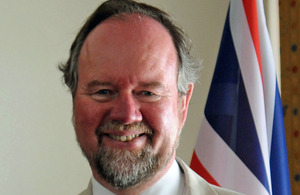We urgently need more Palestinian-British dialogue, not less!
An Op-ed by Sir Vincent Fean British Consul General to Jerusalem.

HMCG Sir Vincent Fean
The British Government believes that 2013 is the crucial year for tangible progress to end the Israeli/Palestinian conflict. The status quo is neither acceptable nor sustainable. Our role in resolving the conflict today differs from our role in the past. Where once – in the first half of the 20th Century - we exercised power, today we exercise a significant degree of influence, with our European partners. We will exercise our influence constructively and fairly for the common good, for a just and lasting peace. The U.S. today, as the sole world power, is indispensible to the effort to bring peace, but the United Kingdom must make an important contribution here. We will make every effort to mobilise European and Arab states behind decisive moves for peace.
We need an intensified dialogue with the Palestinians – Leadership and people – to ensure that our policy today meets the needs of today. The official mission of this Consulate-General is summarised in two sentences. The first is:
To work for a just peace between a stable, democratic Palestinian State and Israel, based on 1967 borders, ending the Occupation by agreement.
Britain strongly supports the urgent, intensive efforts of Secretary Kerry to identify a way forward. The only answer, in the end, will be an agreed 2-state solution. Time is short. We need a collective effort to achieve a lasting, just solution to the conflict, which enables the Palestinian people to live in peace, dignity and equality with their Israeli neighbours.
To do our job properly, we must know what Palestinians need, and what they wish. We listen to the Palestinian Leadership in the PLO and in the Palestinian Authority. But the views of all Palestinians matter equally – including in your universities, the centres of Palestinian excellence from which the future generations of Palestinian leaders will surely come. That is why I deeply regret my lost opportunity to conduct a dialogue with students and staff at Birzeit University last month – and why we now seek to intensify our dialogue with Palestinians from all walks of life who are willing to share their frustrations, daily challenges and above all their hopes with us. It matters that we should understand your views, and should explain our policies, which everyone is free to accept, reject, or seek to change by persuasion.
The second part of the Consulate-General mission is:
To strengthen ties of friendship between the Palestinian and British peoples.
This important task goes far wider than relations between governments. People matter.
Here are some facts, of which I am proud:-
-
The UK is helping to address the needs of the Palestinian people and support President Abbas’s state-building efforts through the Palestinian Authority. From 2011-15 our development programme alone is investing NIS 2 billion. Among other positive results this will enable 217,000 needy individuals to benefit from cash transfers, and 36,000 children to go to primary school.
-
Earlier this month, British Minister for International Development Alan Duncan opened a new UNRWA school in Gaza – one of 12 being funded by the UK, which is the second largest bi-lateral donor to UNRWA.
-
Around 40% of the UK’s development assistance to Palestinians (NIS 200 million a year) goes to Gaza:
-
During his visit, the International Development Minister launched 3 new programmes: a major (NIS 80 million) project with the EU to help the Palestinian private sector to make new products and find new markets – helping to create jobs for Palestinian graduates, among others; a programme to support stability and promote democracy, working with Palestinian civil society to help the Palestinian Authority to be more open and accountable, and a project to improve access to legal aid for vulnerable Palestinians to defend their housing, land and property rights in East Jerusalem, Gaza and the West Bank.
-
The British Consulate-General works to support Palestinian communities to safeguard their future by drafting housing plans in East Jerusalem and in Area C of the West Bank.
-
Last year we sponsored an objective legal analysis of the way in which Palestinian children are treated under Israel’s military justice system. We will continue to work for change in this important area
-
The British Council gives priority to working with young Palestinians to enable them to develop the skills they need to empower them, share knowledge and experience and gain a better understanding of each other, and realise their full potential. It does this through its interconnecting areas of work in English, the Arts, Education and Society.
-
And the British Council is now resuming direct teaching of English in Ramallah and East Jerusalem, and plans to extend this opportunity further in the West Bank and Gaza.
The present day challenges facing the Palestinian people evoke great solidarity and sympathy among citizens in Britain – in Parliament, in our churches, mosques, Trades Unions, charities… and universities.
I would like to see more bilateral exchanges in key sectors such as health, justice and upholding the rule of law – where there is so much work still to do – and to see more friendship associations between parts of the United Kingdom and Palestinian cities, towns and villages, like the friendship between Nablus and Dundee, or between Ramallah and Hounslow.
It is through dialogue and constructive exchange of views that we will change the situation for the better. Where Palestinians choose to talk to Britain, I will be there to listen. Where there is space and the will for dialogue, we want to understand, and to put our influence to best use, where we can. I look forward to a new and productive conversation between the Palestinian and British peoples.